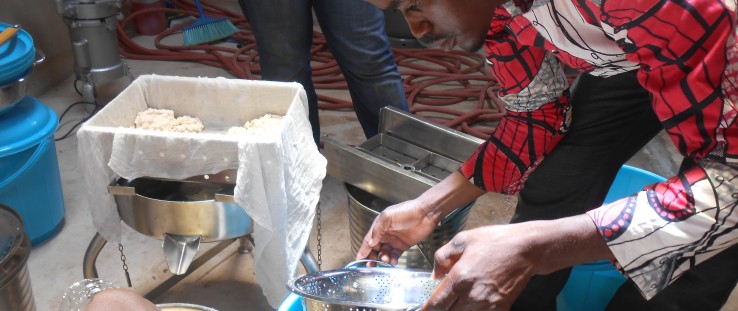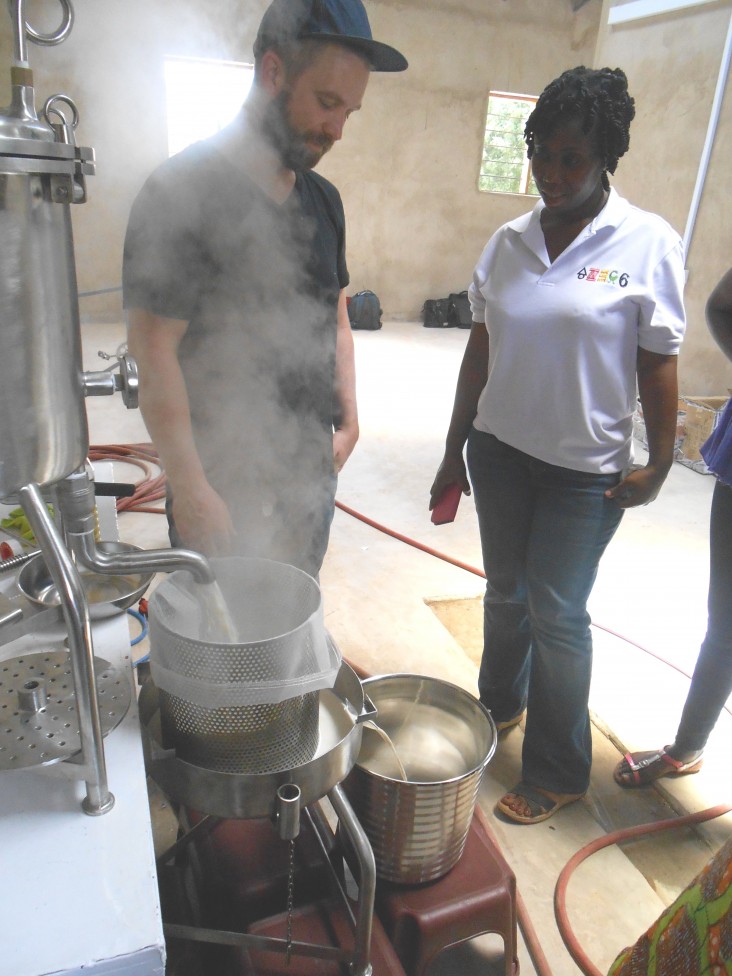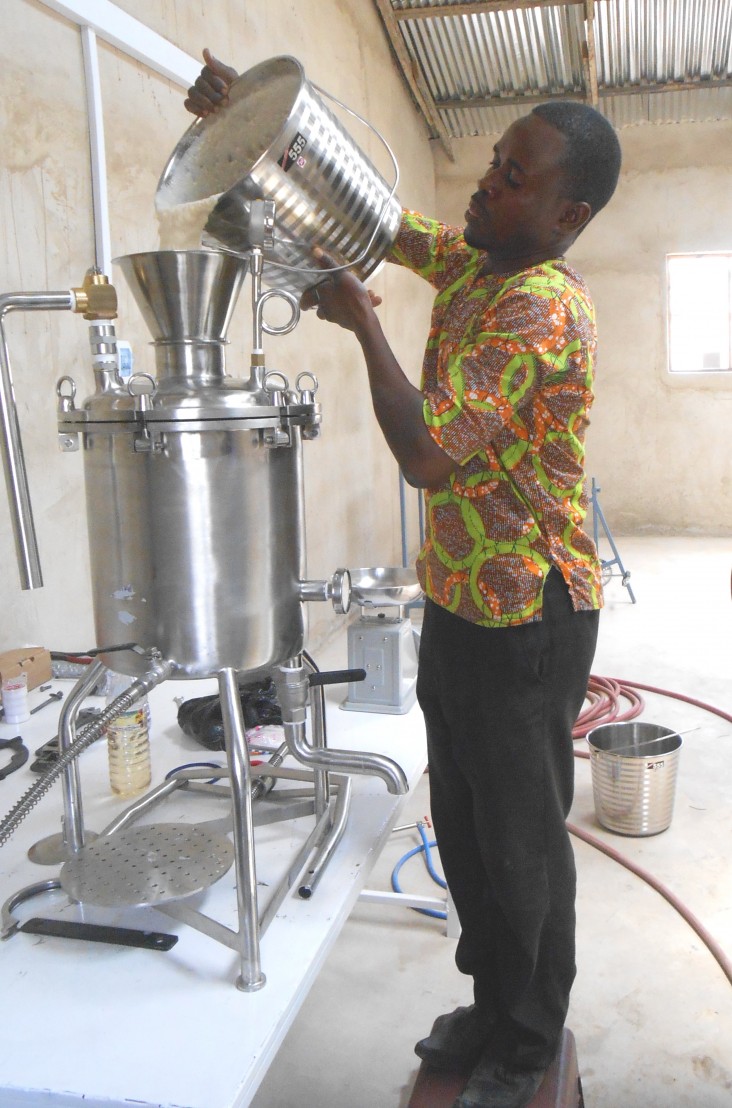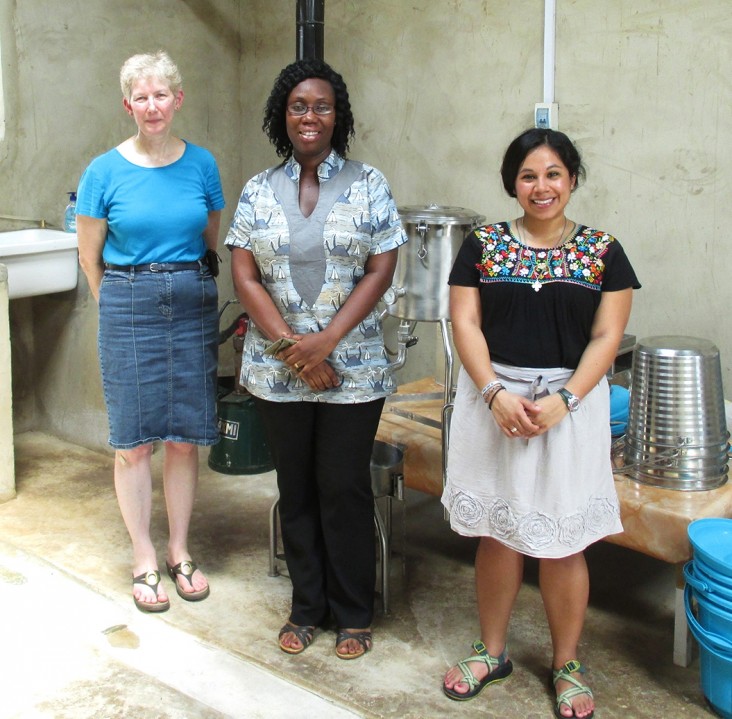 Tofu curds are placed into a form at the Savanna Agricultural Research Institute.
Marilyn Nash
Tofu curds are placed into a form at the Savanna Agricultural Research Institute.
Marilyn Nash
 Tofu curds are placed into a form at the Savanna Agricultural Research Institute.
Marilyn Nash
Tofu curds are placed into a form at the Savanna Agricultural Research Institute.
Marilyn Nash
Speeches Shim
In northern Ghana, where an estimated four out of 10 children are malnourished, a low-cost, high-protein food source like soybean is growing in demand. The high-quality protein delivered in one 8-ounce serving of soy milk can meet one-third to one-half of the protein requirements for school-aged children.
Few have access to protein resources like meat, milk and eggs here. Fortunately, the protein contained in soybeans is comparable to animal protein. However, unlike animal protein, soy is readily available and affordable. Yet producing soy foods and familiarity with the nutritional and health benefits of soybean is lacking.
Flora Amagloh hopes to change that.
“We’re visiting schools in our communities, distributing soy milk to the schoolchildren as a means of creating awareness among the children on the nutritional and health benefits of soybean, and also to introduce them to soy,” she said.
Amagloh is a food scientist with the Savanna Agricultural Research Institute (SARI) in Ghana. The institute is one of 13 under the Council for Scientific and Industrial Research in Ghana. It is located 16 kilometers west of Tamale in the country’s northern region, where researchers develop and introduce improved technologies that will enhance farm productivity.
In 2015, SARI partnered with the Feed the Future Innovation Lab for Soybean Value Chain Research to develop a soy foods enterprise facility at the institute.
The Soybean Innovation Lab, led by the University of Illinois, is USAID’s only comprehensive program dedicated to soybean research for development. An international team of tropical soybean experts provides technical support to practitioners tasked with soybean development, including private sector firms, NGOs, extensionists, agronomists and national agricultural research systems.
“We decided to accept the challenge and see how we could contribute to our community by improving the nutritional status of women and children, particularly in northern Ghana,” Amagloh said.
SARI and the Soybean Innovation Lab partnered with the organization Malnutrition Matters to install and provide training for soy processing equipment known as a SoyCow. A SoyCow is a device that grinds and cooks whole soybeans, turning them into soy milk and other soy foods like tofu. A SoyCow consists of a grinder, 10-gallon pressure cooker, filter press and steam boiler, with all of the equipment easily fitting into the back of a small pickup truck.
These devices are well-suited for developing countries and provide employment for three to six people, promote entrepreneurship, and provide nutritional food to hundreds.
There are currently three SoyCow operations in Ghana.
Amagloh’s facility currently employs two women and three men. Since the installation, the facility produces soy milk four times per day, three days a week, yielding a total of 35 liters of soy milk per day.
The soy dairy facility serves three purposes: to evaluate the adoption of soy products, provide soy product samples for community outreach efforts, and supply local schools with soy milk. As the business becomes established, Amagloh hopes to also supply soy dairy products to local supermarkets, hospitals and restaurants.
“Providing soy milk daily to children in school encourages their regular attendance,” said Marilyn Nash, lead researcher for the Soybean Innovation Lab’s human nutrition efforts. “The children look forward to their morning soy milk, and for many this will be their breakfast. Teachers report that this protein rich snack improves their ability to be alert and attentive, and increases their energy.”
In addition to running the soy facility, Amagloh travels to surrounding communities providing soy milk tastings, basic nutrition education and demonstrations on preparing soy-enhanced dishes.
“We want to train women entrepreneurs and that’s one of the things we’re doing in the local community, showing them how they can process soy milk. Not with our sophisticated equipment, but at the household level so they can generate income in their own way to provide additional revenue for their family,” said Amagloh.
“We will make the soy dairy facility (at SARI) not just a self-sustainable commercial soy dairy operation,” she added, “but also be able to provide needed research and training to others in the community.”
Amagloh’s outreach is part of a strategic business plan developed by SARI to ensure the soy dairy facility becomes sustainable with a developed market and strong customer base. It is also part of a soy dairy enterprise network developed by the Soybean Innovation Lab. The network supports and trains managers to recognize the importance of good recordkeeping and formal managerial control, shares best practices and conducts trainings.
“The soy dairy enterprise network is the first of its kind, connecting soy dairy operations in Ghana and Mozambique, and eventually worldwide, to enable entrepreneurs to share their gathered experience, business practices, training and technological knowledge,” said Krystal Montesdeoca, the Soybean Innovation Lab’s food business economist.
Establishing a sound foundation for soy dairy enterprises will, the Soybean Innovation Lab hopes, spur more successful private sector growth, and in turn stimulate economic development, improve nutrition and reduce poverty.







Comment
Make a general inquiry or suggest an improvement.